Cyclists Rights In NYC / Queens
Knowing Your Rights & Responsibilities As An NYC Cyclist
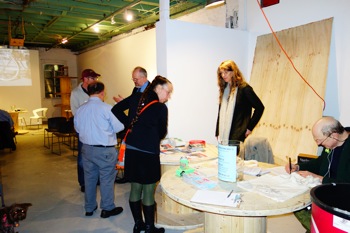 Updated Spring 2015 / Long Island City Neighborhood / NYC Cylists Rights In Queens / Queens Buzz. By Philip Papas. The introduction to the Cyclists' Rights Forum was given by Christina Vassallo, Executive Director, Flux Factory. She told us that the event came about after she and a friend were stopped for cycling violations, which they thought were not illegal, or had erroneously been applied as violation points to their motor vehicle driver’s license. As a result she saw the need for a forum to clarify laws, rights and proper procedures for cyclists to follow.
Updated Spring 2015 / Long Island City Neighborhood / NYC Cylists Rights In Queens / Queens Buzz. By Philip Papas. The introduction to the Cyclists' Rights Forum was given by Christina Vassallo, Executive Director, Flux Factory. She told us that the event came about after she and a friend were stopped for cycling violations, which they thought were not illegal, or had erroneously been applied as violation points to their motor vehicle driver’s license. As a result she saw the need for a forum to clarify laws, rights and proper procedures for cyclists to follow.
Click here to read our full report about NYC Bike Laws / Cyclists' Rights Forum in Queens at the Flux Factory in LIC.
Cyclists Rights In NYC / Queens
Knowing Your Rights & Responsibilities As An NYC Cyclist
November 7, 2013 / Long Island City Neighborhood / NYC Cylists Rights In Queens / Queens Buzz. By Philip Papas. Continued.
Transportation Alternatives Queen - Cylists' Advocacy Group
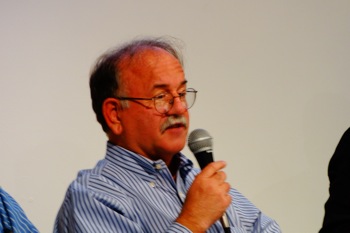 Steve Scofield, Co-Chair of Transportation Alternatives Queens [TA or TAQ] Committee spoke briefly about the organization and outlined some of the advocacy projects they work on, such as the proposed Pulaski Bridge Bike lane, which requires allocating one current car lane to it, and for traffic calming procedures on 21st street and Queens Bvd.
Steve Scofield, Co-Chair of Transportation Alternatives Queens [TA or TAQ] Committee spoke briefly about the organization and outlined some of the advocacy projects they work on, such as the proposed Pulaski Bridge Bike lane, which requires allocating one current car lane to it, and for traffic calming procedures on 21st street and Queens Bvd.
Steve introduced the panel and the agenda for the evening. The panel included: 1) Steve Vacarro, attorney for Vacarro & White, 2) Don Aridas, NYPD officer & TAQC volunteer and 3) Peter Beadle, attorney, Biedermann Hoenig Semprevivo.
Steve Vaccaro - Attorney For Vacarro & White - Cylists Rights In Queens NYC
Steve Vacarro, attorney for Vacarro & White said that the bicycle laws in NYC are much more complex than most people realize. He noted that there are five different sources for laws in NYC.* The legal work is also complicated by the growing NYC & Queens biking infrastructure and there are more cyclists than ever before. There was a time when cyclists could circumnavigate laws more easily because biking violiations were minimal because there weren't many NYC / Queens cyclists - relatively speaking. Now cyclists are  much more visible, because there are so many of them in NYC and Queens. Steve told us that you should not get points taken off your driver’s license for a bicycle infraction.
much more visible, because there are so many of them in NYC and Queens. Steve told us that you should not get points taken off your driver’s license for a bicycle infraction.
NYS & NYC Cyclist Laws - Cycling In Queens
Steve Vacarro went on to say that sometimes the NYPD incorrectly use state laws that do not apply in NYC to cite cyclists. Some such New York State cycliing laws used are: VTL 1234 (New York State Vehicle and Traffic Law 1234 which requires all bicyclists to do the following: 1) ride on the left-hand side of the street 2) ride no more than two across and 3) ride in a bike lane if provided.
Steve introduced BikeNYC Law Decision Tree flow chart to help clarify laws applying to cyclists in NYC. For a more detailed view go to:
www.streetsblog.org/category/specialfeatures/street-justice/page/2/
Bicycles are officially categorized as recreational vehicles, not motor vehicles. As such they are treated as equal in legal responsibilities, with some exceptions. There are laws that apply only to cyclists such as using bike lanes, and keeping both feet on pedals at all times, etc. There are also laws that apply only to motorists (use of seat belts, using the turn signal a certain distance from the intended turn (which is too long to be safe for a cyclist to keep one hand extended off their handlebars), etc.. Motorist violations such as DWI and illegal use of cell phones, also do not apply to cyclists.
There are some legal grey areas which are ‘practicable,’ meaning they should be followed, unless there is some compelling reason to do otherwise. For example bikers are supposed to ride in lanes when a street has one, unless the cyclist is turning on the opposite side of the street. For example making a left turn off of a one-way street when the lane is located on the right side of the street. Or when there is a blockage in the lane which renders it unsafe to stay in the lane. In such cases, it is permissible for the cyclist to exit the bike lane for a reasonable time to facilitate function or safety.
Queens Cyclists should basically follow the Golden Rule - avoid engaging in provocative behaviors, or impede pedestrian or motor vehicle flow. This especially applies when stopping at intersections.*
Steve noted that there are fitness benefits to stopping and starting, an added incentive against trying to ride through a red light or stop sign. Toe clips and a top tube pad can help give the cyclist a more comfortable means of standing at lights with one foot on the pedals.
Steve answered a question about cycling in Queens parks, saying that the parks have very specific areas designated for cycling. He noted that a DOT bike map will show this as a green line and that cycling on other paths in parks carries serious criminal charges. He also said red lights in Central Park, et al, are to be treated as any red light (STOP!) but the police have been known to look the other way in recognition of groups like NYCC or other park-frequenting riders providing they go carefully through red lights when there are no pedestrians nearby, in harm’s way.
Don Aridas, NYPD Officer & Transportation Alternatives Queens Volunteer
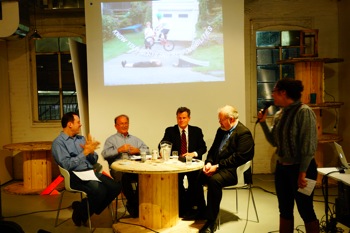 Don Aridas, NYPD officer & TAQC volunteer, informed us that he was there speaking as an individual, NOT as a NYPD representative. He was there to provide opinions as a cyclist who happens to have the experience / insight of being a member of the police force.
Don Aridas, NYPD officer & TAQC volunteer, informed us that he was there speaking as an individual, NOT as a NYPD representative. He was there to provide opinions as a cyclist who happens to have the experience / insight of being a member of the police force.
Don is often asked whether the police target cyclists. He answered no. The NYPD merely responds to cyclist violations. If there have been complaints registered about violations in a specific area and / or by a certain group of cyclists (such as food delivery riders), the NYPD will address this by targeting the violation behaviors. But he said they are not ‘out to get cyclists', per se.
Don told us that the NYPD has task units set up to target certain issue categories, such as homelessness, and cycling violators are in one of these categories. He told us that the NYPD does not have ‘quotas’ for cyclist violations, but an officer may be given ‘performance objectives’ based on category issues, such as a day’s assignment to cite ten cyclists for violations in a given area.
He said that the best way to avoid a summons was to avoid breaking the law. Don has cycled the NYC streets for twelve years and has never been stopped once, because he generally obeys all laws pertaining to bikes.
He gave us his top three great reasons to not break bicycling laws:
1. Avoid the hassle and expense of getting a summons.
2. It is safer for the cyclist and everyone around.
3. It projects a positive image for cycling, which is especially important now that cyclists are increasing in number and are gaining ground in the NYC and Queens infrastructure (ie, bike lanes, citibike, etc.)
Don also gave us his top three best ways to avoid breaking the law.
1. Know the laws that apply to riders.
2. Have required safety equipment (eg, Bells, lights, reflectors, working brakes on your bike).
3. Use hand signals to indicate turns, stopping, etc.
Don told us that an example of a law that many bicyclists violate - perhaps because they do not know better - is that having one headphone or ear bud covered is permissible, but not two. This makes sense, as you need your hearing to stay safe and be aware of your surroundings.
Don advised us regarding things to do if you are stopped by the police:
1 Act respectfully; address the officer as Officer, Sir or Ma’am - not with informal or disrespectful terms.
2 Answer the officer’s questions truthfully; it’s better to admit you ran a red light if you did. You can mention the reason for doing so if there is one (late to work, didn’t see it, etc.).
3 If they do not let you off with a warning, but instead write the summons, don’t challenge them. You can fight the charge, but the proper forum for that is in court.
4 Don’t belittle or attack the officer (saying things like you’re just after cyclists or are you filling your quota?).
He also noted that it is important to carry a government issued photo ID. If you do not have one, it is difficult to have a summons written after being stopped for committing a violation - but you probably will be arrested in that case. It is very unusual to be let go if you are stopped and do not have an ID.
If you get a summons, you should review the summons to know what you have been charged with and what the penalty is. Also note the date of the scheduled court appearance, and make sure you (or your legal representative) show up.
Attorney Steve Vaccaro pointed out these summonses state there is a surcharge of $88.00 but this, in fact, is not applicable to cyclists - if you pay online, you will automatically be charged the fee, so it’s better to pay by check and deduct the $88 from the total cost.
NYPD Officer / TAQ Volunteer, Don Beadle answered a question regarding pedestrians blocking bike lanes. He said that unless the pedestrian is actively provoking or challenging the cyclist, they are unlikely to be ticketed. Such incidental, non-provocative blockages fall into the category of ubiquitous minor offenses which the police do not have the resources to ever realistically combat.
Don also answered a question about the police blocking bike lanes. He said that the NYPD typically parks in lanes or in other prohibited areas only because of necessity (eg, to secure an accident or crime scene), or when they need to make a fast stop and be as close to their vehicles as possible, in case of an emergency call. Realistically, if the NYPD only used available legal parking spots, they might be so far from their vehicles that their response time to a 911 call could mean the difference between life and death for the caller.
Don and Attorney Peter Beadle replied to a question regarding illegibly written summonses; you still must appear on the date, but if the officer who wrote it does not show up for the date (or a second rescheduled date) and no one can decipher what is written, it may very well be dismissed.
Peter Beadle - Attorney For Biedermann Hoenig Semprevivo - Biking Laws In NYC & Queens
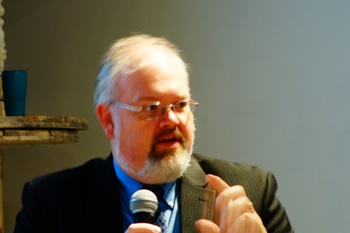 Peter Beadle, Attorney, Biedermann Hoenig Semprevivo talked about what to do if you are involved in an accident.*
Peter Beadle, Attorney, Biedermann Hoenig Semprevivo talked about what to do if you are involved in an accident.*
1. Safety first - are you injured? If you are in the road, near traffic or other hazards, get to a safe location.
2. Call 911 asap to get police there fast; you will want a record of what happened.
3. Collect as much information as possible. Get names of people involved, street names, license plate numbers of vehicles involved. Get info from police to know which precinct and patrol car responded to the 911 call and is making the report.
4. The more detail, the better. This includes vehicles (Color/make/model of cars involved, even just the first and/or last number on license plate) and any road or other scene conditions that may have contributed to the incident (loose grates, unsecured manhole covers, dangling wires, etc.), if possible showing the name of the utilities or other corporate or institutional names, logos and numbers on them.
5. Take photos of the scene, yourself, bicycle damage, etc. Video is also very helpful if possible.
If there has been any degree of injury or property damage, you may be in for a long legal/insurance process, and you will need this info to support your case.
Peter told us what to do following the accident*:
1. Seek medical attention if you are having any pain or discomfort. Remember, pain and other after effects can show up hours or even several days after the incident.
2. Do not repair your bicycle, fix rips or wash blood or stains off your clothing, or similarly destroy any other evidence which you may need to substantiate your claims going forward.
3. If you feel someone was at fault and you may need to file an insurance claim, you should consider contacting an attorney. Even if you do not need to sue, a simple and relatively inexpensive consultation may be helpful in making sure you follow the best procedure in filling out paperwork to file claims, saying the right things when speaking to an insurance company representative, etc.
• Statutes on accident claims*:
1. You need to file a claim within 30 days with the carrier of the vehicle’s no-fault insurance. The sooner you begin this process, the better, so that you or your legal representative has sufficient time to complete all the required steps.
2. If you are the victim of a hit and run, or if the vehicle operator is uninsured, you must file a report with the Police or the DMV within 24 hours. In the case of serious injuries under these conditions, you have 90 or 180 days, respectively, to file a Notice of Claim with the Motor Vehicle Accident Indemnity Corporation (MVAIC) for coverage.
3. You may also file a claim against the City of NY if you feel they are at fault; you have 90 days to do so, with an additional year to begin legal proceedings.
4. If you are the person who caused injury or property damage, your homeowners or renters insurance may provide coverage for you, depending upon the circumstances; in any case, to protect yourself it behooves cyclists to know their level of insurance coverage and seek adequate coverage as needed.
5. There are bicycling-specific insurance companies; examples given on slide.
• Flux Factory’s Residency Director Douglas Paulson showed attendees a spoke card they created for cyclists to carry in their wheels - in addition to being decorative, it contains important information to have on hand in case of accidents or when cyclists are pulled over by the police for violations.*
• Peter told an attendee who asked what to do if they witness another cyclist’s accident to assist in following the previously described procedures - ensure their safety first, and if they are unable to do so themselves, call 911 and then begin to collect accident scene information for them.
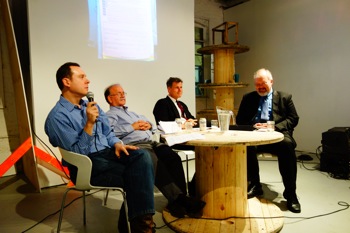 • Steve Vaccaro added that he himself has experienced the Fight or Flight adrenaline rush that comes with being a cyclist involved in an accident. He stressed cyclists should resist the urge to flee the scene to their home or workplace, or other nearby comfort zone. Witnesses should also do their best to convince other cyclists to remain at their respective accident scenes until they have followed the necessary steps as already outlined.
• Steve Vaccaro added that he himself has experienced the Fight or Flight adrenaline rush that comes with being a cyclist involved in an accident. He stressed cyclists should resist the urge to flee the scene to their home or workplace, or other nearby comfort zone. Witnesses should also do their best to convince other cyclists to remain at their respective accident scenes until they have followed the necessary steps as already outlined.
• Steve Vaccaro responded to a question about what cyclists should do if they are in an accident but have no insurance of their own, which dissuades them from visiting a hospital ER for fear of incurring high medical bills they cannot pay. If the cyclist is under-insured, treatment of their injuries could well be paid for by no-fault insurance; if a motor vehicle was involved, the bills will definitely be covered, even if the cyclist was at fault. Even when the incident involves only bicycles or pedestrians, there still could be no-fault coverage; the bottom line is, if you have any question about potential harm or injury, you should seek medical attention.
* This is refers to the attorney disclaimer of providing general legal information in a public forum. We'll try to get the exact disclaimer to you shortly.
Special Thanks To The Orgs & Panel Members - For Bicycling Rights In Queens, Astoria, LIC, Sunnyside, Woodside, Jackson Heights, Elmhurst, Corona, Flushing & Jamaica NY
All in all it was a very informative session. I think we all learned something we hadn't known before regarding cyclists' rights in Queens NYC. Many thanks to the Flux Factory, Transportation Alternatives Queens Committee for hosting and organizing the forum.
Also special thanks to Christina Vassallo, Executive Director, Flux Factory; Steve Scofield, Co-Chair of Transportation Alternatives Queens [TA or TAQ] Committee, Steve Vaccaro - Attorney For Vacarro & White; Don Aridas, NYPD Officer & Transportation Alternatives Queens Volunteer and Peter Beadle - Attorney For Biedermann Hoenig Semprevivo.
Photos of Cyclists' Right Forum At The Flux Factory In Queens
The following slide show contains photos of Cyclists' Rights in NYC Forum At The Flux Factory In Queens. Click here to go to the Biking in Queens section of this site.
$element(ophoto,photo_slideshow,250,660,,5.00,fade)$
11.13.2013
LIC Neighborhood - Long Island City Links
Click on these advertisements for promotions, discounts and coupons by retailers and restaurateurs in Long Island City LIC and nearby Queens. Click here for a related story about the hotels & restaurants in Dutch Kills section of Queens.
Click this link to go to the:
Long Island City Neighborhood or LIC Business Directory
Long Island City Real Estate or Events & Things To Do In LIC
Restaurants In Long Island City or LIC Shops & Shopping
Site Search Tips. 1) For best results, when typing in more than one word, use quotation marks - eg "Astoria Park". 2) Also try either singular or plural words when searching for a specific item such as "gym" or "gyms".
$element(bwcore,insert_search,N)$
Click this link to search for something in our Queens Business Directory.
$element(adman,groupad,Sectional2 Ad)$
Click the log in link below to create an ID and post an opinion.
Or send this story to a friend by filling in the appropriate box below.

















